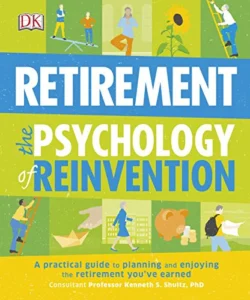Once again I am broadening the scope of my reading with Retirement – the psychology of reinvention by Kenneth Schultz. I picked up this book second-hand for only a few pounds from World of Books (link above) which might be counted as part of my retirement financial planning.
I was made redundant a couple of years ago but then worked as a contractor for UNOCHA for a little over a year, finishing at the end of 2024. Last month I turned 55. Potentially I am retired but intend on doing some consultancy work, so this book is very relevant to my current circumstances.
Retirement is divided into six chapters covering the (1) wider context of retirement, (2) early planning for retirement, (3) challenges in the lead up to retirement, (4) the transition from work to retirement, (5) the psychology of retirement, and (6) reinventing yourself in retirement. Each chapter is comprised of two page spreads with their own title, occasionally extending to four pages. The text is broken up into short chunks and is heavy with graphics. There are frequent references to other research, with key figures presented in infographics. All in all it is an easy read without feeling too patronising.
The context chapter talks about how work is often a very central part of our lives. Work is not only important for financial reasons, but also for social reasons and how we value ourselves. Also in the first chapter is a short discussion of the each of the decades of retirement from your fifties through to your eighties, Shultz notes that we are likely to live 10 years longer than our parents. Health plays a fairly prominent role: whilst our health potentially declines in retirement we have more time to address health and fitness issues.
For me the chapters on early planning and the lead up to retirement are a bit late and I won’t be alone in that. As many as 50% of people retire involuntarily, often for reasons of caring for another or their own illness, redundancy no doubt plays a significant part too. All of these apply to me to some extent. The IFS has shown that, in the UK, as many as 20% of men at 55 are economically inactive, with a proportion of those indicating they are retired (see page 8, figure 2 in this report).
As we move into retirement a degree of anxiety is not unexpected but often there is a honeymoon period for the best part of a year before boredom strikes. Sometimes this is a bit of a lonely mission – only 20% of couples retire in the same year, women often find retirement more difficult because they have done the majority of housework which they then continue to do in retirement so the event seems a bit of anti-climax.
Many of us hope to do some paid work in retirement, 34% according to one study but fewer – 14% – actually manage it. Not mentioned in this book but my observation from very limited data is that consultancy works for the former employees of larger companies which have some semi-formal scheme for consultancy with their own retirees. Mentoring also gets a mention here as valuable work for the retiree.
Others go for a full-on second career or start their own businesses, perhaps completely unrelated to their pre-retirement career. Volunteering is another option – it has very high retention rates, of 80%, for those that chose to volunteer for things that interest them.
Somewhat surprisingly one of the risks of retirement is the “busy ethic”, throughout our working lives busy-ness is valued and in retirement there is a tendency to try to replicate that. Typically retirees get most benefit from having a four or five hobbies/activities and those that work best are generally those they had some time for prior to retirement.
As stated in the subtitle this book is informed by psychology and there are numerous places where you can evaluate your personal preferences according to a variety of models. For example, in a section on coping with setbacks Schultz talks about fixed and growth mindsets which are informed by cognitive behavioural therapy (CBT).
Although the author is American the research he cites covers at least the UK, as well as the US. There is perhaps an over-emphasis on funding healthcare which belies his home country. This book makes very little mention of financial planning for retirement which is a whole, very large, topic of its own. Schultz mentions that paid financial advice is good for giving you confidence in your retirement plans.
Quite a lot of the fifth chapter is on relationships with other family members in retirement, these can be a bit strained as retirement perhaps puts you together rather more than you have been used to although I can’t help thinking that COVID has changed that, with families forced together full-time for an extended period and working from home more common in the aftermath. Grandchildren and (adult) children are mentioned throughout the book. I suspect more and more families will find themselves in the same position as me as an older parent – my son is 13, so going by our example we won’t have grandchildren for another 30 years and my son is in no position to look after me!
The final chapter talks mainly about the activities you might undertake in retirement including travel, various clubs (some retired friends are trying to persuade me to take up crown green bowling!), gardening, exercise, paid work (as mentioned above), and volunteering. There are some pages on time management and self-assessment here too.
I wish I’d read this book in my forties since a big chunk of the book covers the run up to retirement. It has prompted me to take action, at a leisurely pace, as I enter my first few months of retirement.


